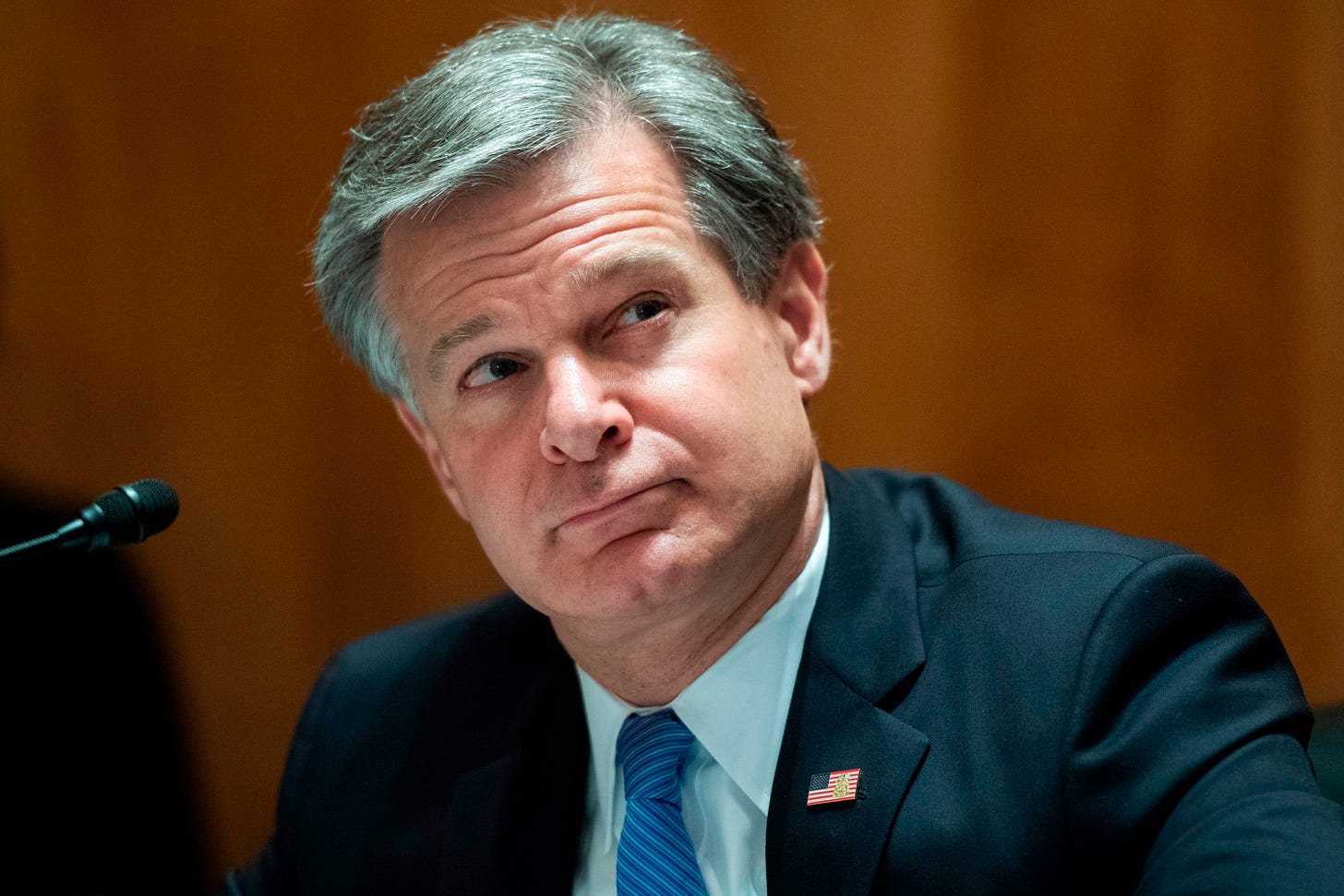
Trump’s Russophilia Has Become Intelligence Policy
The president has always had an unsettling relationship with Vladimir Putin’s regime, but only recently has it infected the rest of the government.

Multiple reports suggest U.S. officials risk the wrath of President Trump whenever they discuss misbehavior by Russian President Vladimir Putin, including ongoing interference in the U.S. presidential election. The most recent example comes from FBI Director Christopher Wray’s testimony before the House Homeland Security Committee.
Wray was categorical about ongoing Russian interference in the U.S. presidential election. “We certainly have seen very active—very active—efforts by the Russians to influence our election in 2020,” Mr. Wray said, specifically “to both sow divisiveness and discord, and I think the intelligence community has assessed this publicly, to primarily to denigrate Vice President Biden in what the Russians see as a kind of an anti-Russian establishment.”
Within hours of Wray’s sworn testimony, President Trump expressed his disapproval. “But Chris, you don’t see any activity from China, even though it is a FAR greater threat than Russia, Russia, Russia,” Trump tweeted.
Trump continued to express his disapproval the next day noting, “We’re looking at a lot of different things and I did not like his answers yesterday and I’m not sure he liked them either. I’m sure he probably would agree with me. And if you look at it, who is the real problem? The big problem is China. And we can have others also and I’m not excluding anybody. But the big problem is China, and why he doesn’t want to say that, that certainly bothers me.”
Despite Trump’s unwillingness to point the finger at Putin, the intelligence community finds the evidence overwhelming. According to a classified CIA report disclosed by the Washington Post’s Josh Rogin, the CIA concludes that “President Vladimir Putin and the senior most Russian officials are aware of and probably directing Russia’s influence operations aimed at denigrating the former U.S. Vice President, supporting the U.S. president and fueling public discord ahead of the U.S. election in November.”
At the same time, CIA Director Gina Haspel reportedly has reduced the flow of Russia-related intelligence for review by the president, who famously does not react well to such information. Attorney General William Barr, when asked during an interview on CNN earlier this month, said China was the bigger threat, more than Russia. Robert O’Brien, Trump’s national security adviser, in an op-ed in the Wall Street Journal, listed China ahead of Russia in discussing threats to the U.S. election. Nobody disputes that China is interfering in the election; the difference is that Russian efforts are far more developed and persistent and seek to stir the pot and sow divisiveness, as FBI Director rightly said, on sensitive social and racial issues in the United States.
Brian Murphy, a senior official at the Department of Homeland Security (DHS), filed a whistleblower complaint alleging that top officials in his Department ordered him to water down references to Russia in the analytical products produced by his office, under orders from O’Brien. Miles Taylor, former chief-of-staff at DHS, levelled similar allegations.
Last year, Dan Coats, then the director of national intelligence, was fired for refusing to downplay Russia in intelligence reports produced by his office. Joseph McGuire, Coat’s interim replacement, was removed after one of his analysts briefed Congress that Russia interference reflected a preference for Trump over Biden.
Trump’s defense of Putin is long standing. When asked about the murders of Russian journalists in 2017, for example, the president replied, "There are a lot of killers. You think our country's so innocent?" This was one of many occasions when Trump has declined to criticize Putin, insisting instead on the worst kind of moral equivalence—put forward by the president of the United States, no less.
Trump famously took Putin’s word over that of his intelligence community during the two leaders’ joint press conference in Helsinki in July 2018, saying he believed Putin when the Russian leader denied interfering in the 2016 U.S. election. And he recently refused to comment at all on the poisoning of Russian activist Alexei Navalny with the same chemical nerve agent used by the GRU in the assassination attempt on former Russian spy Sergei Skripal in the UK in 2018.
Trump likes to claim that his administration has been tougher on Russia than any previous administration. There is an element of truth to that. Unlike President Obama, the Trump administration has provided Ukraine with lethal military assistance to contest Putin’s invasion of the country’s eastern provinces. The U.S. has sought to break Russia’s energy hold on its near neighbors, including by opposing the Nord Stream 2 pipeline that would circumvent Ukraine and reduce its income from transit fees. U.S. military spending has increased, though Trump can hardly claim sole credit for that. And while the U.S. military presence in Poland has increased, Trump’s plan to withdraw 12,000 American soldiers from Germany has created unease about the US commitment to NATO.
Although Trump never criticizes Putin, he habitually attacks America’s allies, especially Germany’s Chancellor Angela Merkel and Canadian Prime Minister Justin Trudeau. He raised doubts in 2018 when he was asked whether the U.S. would defend Montenegro, a new NATO member. And in a second Trump term, former administration officials have openly speculated that he might well decide to withdraw from the alliance, which would fulfill a long-time Russian objective.
Worse than simply defending Putin from criticism, as noted in a “Statement by Former Republican National Security Officials for Biden” (which we both signed), has been Trump’s explicit request in 2016 for Russia to meddle in that election by finding and releasing Hillary Clinton’s missing emails. He has spoken to Putin numerous times this year with virtually no readouts of the calls from the White House. He has said, however, that he has not raised reports that Russian forces offered bounties on American soldiers to Taliban fighters in Afghanistan. In typical fashion, he dismissed those reports as a hoax and fake news.
Why Trump seeks to suppress and downplay gross Russian misbehavior is a mystery. Some, including the journalist Tim Weiner, entertain the possibility that Putin has some leverage over Trump, and even wonder whether Trump is a Russian agent. Bob Woodward’s new book, Rage, suggests Coats held “deep suspicions” that Putin “had something” on Trump. Coats, according to Woodward, could see “no other explanation” for the president’s behavior toward the Russian president.
The recent bipartisan Senate Intelligence Committee report documents scores of hitherto unreported contacts between the Trump campaign and Russians during 2015-16. Both of us have been involved in other Republican presidential campaigns in 2012 and 2016 and can attest that this level of contact is unprecedented. What those contacts represent remains unclear.
What is clear, however, is that Trump’s obsequiousness toward Putin has done real harm to American national interests. Trump repeatedly claims that it would be great if he and Putin got along. The big question is: great for whom?









